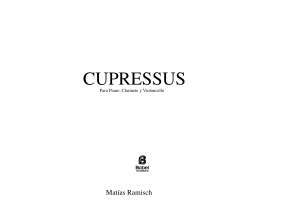Transcendentals
for 19 instruments
13,00 €
Version numérique (+0,00 €) à télécharger
Version papier (+21,40 € impression et livraison ). Colissimo7-14 days aprox.
Chez BabelScores, quand vous achetez une partition, vous pouvez ensuite contacter directement le compositeur ici même !
Caractéristiques
Region
North America (Canada - USA)
Estimated Duration
11 - 15min
Date
2016
ISMN : 979-0-2325-6518-7
Vidéos
Notes sur cette pièce
Ajouter à une playlist
- Identifiez-vous pour créer une liste
“An amazing thing happened to me today, I suddenly forgot what comes first - 7 or 8.
I went to my neigbors and asked them about their opinion on this matter.
Great was their and my amazement, when they suddenly discovered, that they couldn't recall the counting order. They remembered 1, 2, 3, 4, 5 and 6, but forgot what comes next.
We all went to a commercial grocery store, the one that's on the corner of Znamenskaya and Basseinaya streets to consult a cashier on our predicament. The cashier gave us a sad smile, took a small hammer out of her mouth, and moving her nose slightly back and forth, she said:
- In my opinion, a seven comes after an eight, only if an eight comes after a seven.
We thanked the cashier and ran cheerfully out of the store. But there, thinking carefully about cashier's words, we got sad again because her words were void of any meaning.
What were we supposed to do? We went to the Summer Garden and started counting trees. But reaching a six in count, we stopped and started arguing: In the opinion of some, a 7 went next; but in opinion of others an 8 did.
We were arguing for a long time, when by some sheer luck, a child fell off a bench and broke both of his jaws. That distracted us from our argument.
And then we all went home.”
A Sonet (1935), Daniil Kharms
"The mind is raised from the consideration of changeable numbers in inferior things to unchangeable numbers in unchangeable truth itself."
Saint Augustine, De Musica, Book VI.
The title Transcendentals is inspired by transcendental numbers in mathematics. I encountered this fascinating concept while studying number theory at the University of Illinois. Defined as real irrational or complex numbers which are not a root of a simple polynomial equation, transcendental numbers generate infinite series of numbers from fixed algorithms / functions; a transcendental number embraces infinite series of subordinate numbers in it. If I permute the radix of a transcendental number, e.g., from decimal system to hexadecimal or sexagesimal system, I can get another constellation of unborn numbers within a given bound: here 15 for hexadecimal and 59 for sexagesimal.
Transcendentals has its genesis in Medieval organum. Just as the vox organalis (organal voice) was added over the Cantus Firmus (vox principalis, known as the “tenor”), I created my harmonic(frequency) field progression by mapping the infinite subset of a transcendental number to the overtone series of the C. F, creating a myriad of iridescent frequency moonlets. By adjusting the sidereal bases of transcendental numbers, I further manipulated the tonal gravity of frequency nebulae and governed the idiosyncrasy of harmonic colours and levels of consonances and dissonances in each musical tableau.
Instrumentation
Flute|Oboe|Clarinet|Bassoon|Alto Saxophone|Trumpet|Horn (French Horn)|Trombone|Percussions|Percussions (2)|Piano|Electronic keyboard|Harp|Violin|Violin (2)|Viola|Cello|Cello (2)|Double bass
Recording
Illinois Modern Ensemble
Score Details
Format - A3 / Tabloid
Pages - 82
Pages - 82
Pièces similaires






